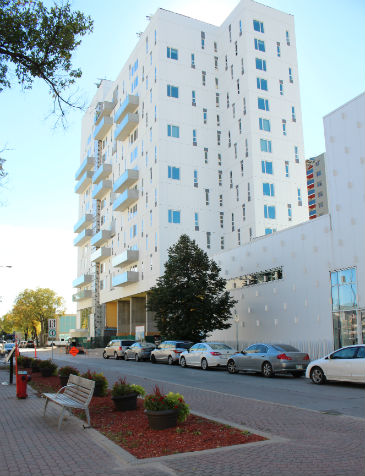
Downtown Commons Sept 22, 2016 staff photo
CentreVenture Development Corporation and The University of Winnipeg’s Institute of Urban Studies (IUS) today released a report examining the key market factors affecting the creation of new housing in downtown Winnipeg. Through a comprehensive analysis of the demographics and economics of the housing market, and a brief overview of the policy history, the IUS concludes incentive-based programs have played a role in supporting and sustaining residential construction in the downtown Winnipeg. The report also highlights that the broader trends that have contributed to a strong decade-plus of growth are the result of policies and programs established by all three levels of government and the private sector. The report was commissioned by CentreVenture as part of its effort to evaluate the performance of the downtown housing market over the last decade and to inform future policies and programs.
“It’s critical that as move forward that we are operating with a strong evidence base behind our actions,” said Angela Mathieson, CEO of CentreVenture. “Our downtown, especially in the housing sector, is achieving results we never thought possible a decade ago. This success has occurred with concerted effort and this report tells us that we can’t click into auto-pilot, if we want to see that momentum continue.”
The IUS report identifies two broad themes in its study of Winnipeg’s downtown. First, the demographic and market conditions are unique compared to the rest of the city, and this is driving both demand for housing and also constrains what the market can offer. Secondly, Winnipeg’s downtown has historically been most successful when all three levels of government are involved in its ongoing development; but success seems to stall when the downtown is ignored. The report highlights the following observations that are critical to informing future investment in downtown housing:
- The population of downtown has grown over 31% from 2001 to 2016, after a 4% decline from 1991 to 2001. The 2016 downtown population is estimated to be 16,800.
- This spike in downtown population beginning in 2006 corresponds to the introduction of city and provincial tax incentives for the creation of new downtown housing units. These programs are unique in Winnipeg’s history and have been effective at energizing downtown housing development.
- Compared to the city as whole, the downtown has a higher percentage of people aged 20 to 39 and a slightly higher percentage of older adults. These age cohorts are driving the market for housing downtown.
- Over 16.6% of the downtown population are recent immigrants, compared to 6.75% city-wide. This concentration of newcomers also drives demand for housing downtown, but often requires housing that is affordable.
- Education levels in the downtown are higher than the city-wide average, with 55% achieving a post-secondary education. Young, educated people are an important driver of the downtown market and critical when considering market conditions for these buyers and renters who are new to the market.
- Average individual incomes are much lower in the downtown, $28,560 compared to $38,159 city-wide. Contributing factors to this lower income includes the lower age of downtown residents, student population, immigrant status and older adults who may be retired. Individual incomes constrain what the market can offer downtown.
- 62% of downtown households are one-person households, compared to only 31% city-wide.
- 72% of downtown housing units are one bedroom or studios, compared to 19% city-wide.
- Median household incomes downtown are $30,474 compared to $57,925 city-wide, again constraining market offerings.
- 37% of downtown households spend more than 30% of their income on shelter, compared to 22% city-wide.
- Only 29% of downtown resident drive a car as their main mode of transport, compared compared to 69% city-wide.
- Downtown experiences higher vacancy rates for larger units at over 4%, with bachelor units closer to 2%.
- Average rents for bachelor, one bedroom, and two bedroom units in the downtown are similar to average rents city-wide.
- The downtown rental housing market is operating normally, with very high demand for new developments and lower demand for older buildings.
- Demand for downtown housing units will continue with an aging boomer generation, new immigrants, and young adults driving demand in this unique Winnipeg market.
The report finds that current and anticipated demographic and economic factors point to higher demand for smaller housing units, targeted to people aged 20 to 39 as well as older adults downsizing from larger suburban homes, for which the diversity and amenities of the downtown lifestyle appeals. It goes on to show that this demographic is very sensitive to price-point, due to lower overall household incomes, especially for those households entering into the market for the first time. For these new-entrants to the market, governments have long intervened to help create opportunities.
“We need to better understand the purchasing power of people who want to move downtown – young people, new immigrants, and older retired adults to better address how we can continue to support affordable options for both renters and buyers,” said Jino Distasio. “Winnipeg has a long history of policy and program intervention in the downtown and tax increment financing has been an effective tool used over the last decade.”
“We want to welcome new-comers, millennials, and boomers to the downtown. The demand is there, but we are limited in our ability to deliver a right-priced product,” said Mathieson. “With higher land prices and high-rise construction costs that can be as much as 50% more than suburban building forms, there is an economic gap, making programs like Live Downtown so critical.”
To read the report visit: www.centreventure.com or www.uwinnipeg.ca/ius/




